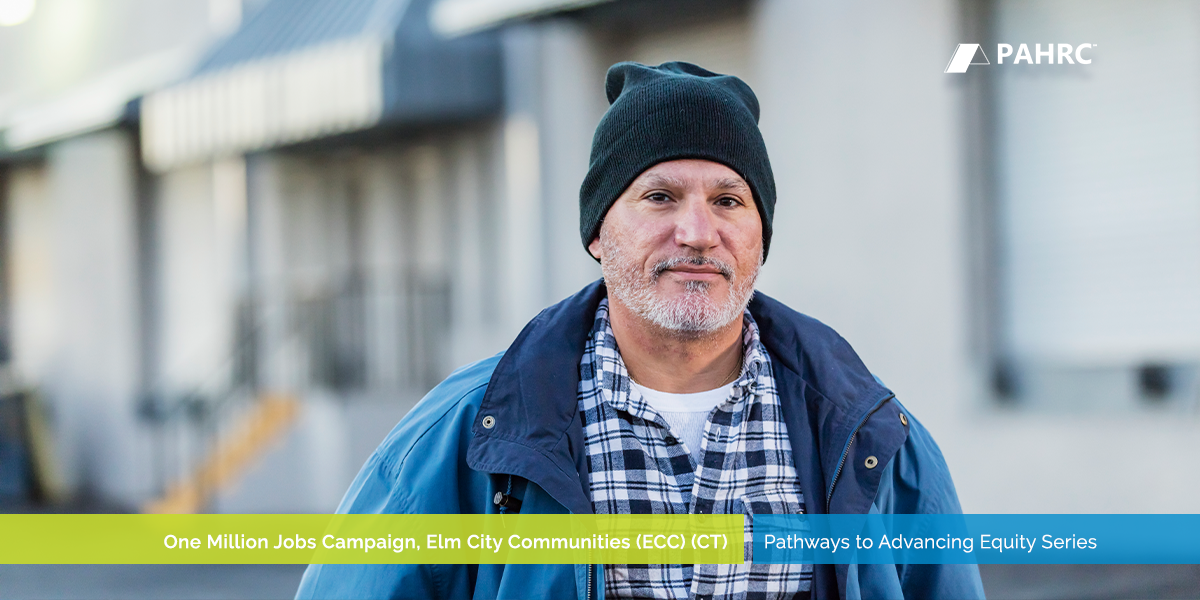Challenge
Formerly incarcerated individuals encounter additional obstacles when seeking employment after their release from jail or prison.
Solution
OMJC advocates for policies and programs that promote job creation and economic development in underserved communities. The campaign aims to reserve 10,000 entry-level jobs for formerly incarcerated individuals in Connecticut by 2027.
Implementation
ECC partnered with CTNAACP in 2022. Their partnership aims to catalyze a pipeline of ECC jobs available to ECC residents and formerly incarcerated citizens of New Haven. CTNAACP workforce partners provide program participants with services to promote workforce development and job retention.
Practices put in place by The Johns Hopkins Hospital serve as the model for the OMJC. In response to a tight labor market, Johns Hopkins eliminated criminal background checks on applicants until a conditional employment offer is made. When a background check reveals a criminal record, the human resources department collaborates with a former police officer to review mitigating factors, such as the time, type, and impact of the conviction, the age of the conviction, steps taken toward rehabilitation, and job duties. For over a decade, 5% of all hires at Johns Hopkins have had a criminal record. A five-year study of these hires found that ex-offenders had lower turnover rates, and the health system reported that the program was successful.
Employers participating in the OMJC commit to providing entry-level job placement opportunities for individuals reentering the workforce after release. By creating more job opportunities for those with previous incarceration records, the campaign seeks to reduce barriers to affordable housing by increasing access to stable employment and income.
Workforce partners include:
These partners refer participants to jobs pledged by employers once the participants complete their training and are ready to enter the workforce. ECC supports the campaign by:
- Sharing job openings.
- Training staff on making employment decisions regarding applicants with criminal backgrounds.
- Providing training to help applicants qualify for open positions.
- Offering internships and job training opportunities for individuals with criminal backgrounds.
- Publicizing the campaign among residents.
- Providing participant referrals.
Additionally, ECC actively engages in local and state policy advocacy, intentionally trains its staff on equity, and invests in historically disadvantaged neighborhoods. This effort aims to counteract historic discriminatory housing policies, such as redlining. ECC partners with other housing authorities and community advocates to support bills addressing exclusionary zoning and other barriers to affordable housing, and it has independently brought its own bills to Connecticut's state legislature.
To reinforce OMJC, ECC has supported reentry by changing its admission criteria, establishing a shorter lookback period, evaluating which conditions require reviews and removing many that previously did, creating a review panel, and reserving homes and vouchers for reentry. ECC also provides equity training for all staff, including required readings that offer a historical perspective on their work and address the impact of segregation in housing.
Today, ECC employs a data-driven approach to examine discrepancies between groups, aiming to identify the reasons for these discrepancies and how to address them.
Impact
According to the OMJC Eighth Report in 2023, the campaign generated an estimated financial impact of $2.7 million, creating 73 jobs at Yale-New Haven Hospital and 17 at Hartford Healthcare.
Organizers aim to expand the program to communities beyond Connecticut to connect formerly incarcerated individuals with one million jobs.
Conclusion
In partnership with ECC and CTNAACP, OMJC is making significant strides in reducing barriers to employment for formerly incarcerated individuals. By fostering job creation and advocating for policy change, ECC is demonstrating its commitment to advancing equity and supporting reentry efforts, serving as a model for other communities aiming to break the cycle of unemployment and housing insecurity.
For further insights and similar case studies, refer to the full report using the button below.
This article is for general information only. HAI Group makes no representation or warranty about the accuracy or applicability of this information for any particular use or circumstance. Your use of this information is at your own discretion and risk. HAI Group and any author or contributor identified herein assume no responsibility for your use of this information. You should consult with your attorney or subject matter advisor before adopting any risk management strategy or policy.






